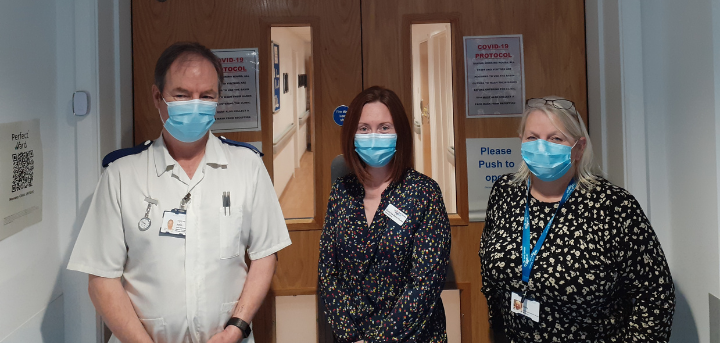Sundowning and dementia

Published on 04 May 2021 05:07 PM
Sundowing and dementia
What is sundowning?
People living with dementia may experience a change in behaviour in the evening. They can often become more agitated or anxious around dusk. This is called sundowning.
Other symptoms of sundowning might include a sense that the person living with dementia is in the wrong place. They may say they need to go home, or that they need to pick their children up, even if this is not the case.
They may also begin shouting or arguing, pacing, or becoming confused about who people are or what’s going on.
What can we do to help with sundowning?
We spoke to Betty Lucas, our Lead Admiral Nurse, to see how we can support people living with dementia who experience sundowning.
“There are several ways to help with sundowning. I find prevention to be best. What I have always found works best is engagement before the usual time that your loved one starts to experience sundowning. Sundowning is an ‘unmet need’. We all have those feelings that we should be doing something but we can work out what it is and rationalise why we are not doing it. Unfortunately, the person living with dementia who is experiencing this is unable to tell us what that need is because of their cognitive impairment but continue to have that ‘unsettled’ feeling.
“I have found engagement or distraction before the signs start works best. It’s very hard to distract once someone becomes agitated and distressed.
“It might be going for a walk, listening to some music, watching a film or doing an activity. Sounds easy but it is not! It is often hard to find that ‘thing’ that helps prevent the person from experiencing sundowning.
“Many years ago (about 1995 – I’m getting on a bit!) I was managing a ward which was for assessment of memory difficulties. All 20 patients on my ward had or were in the process of having a diagnosis of dementia. A large proportion of my patients experienced sundowning with the onset starting between 5.30 pm to 7 pm and many different distractions were required to maintain a calm environment.
“One Friday a new admission came in. A lovely gentleman, we shall call him Fred.
“After tea on the Friday Fred wanted to have a wash and shave and told me he was going to work but he couldn’t say where he worked or what his job was. Fred spent the whole of the evening walking up and down the corridors but was unable to say why. I contacted his wife who told me he was an organist at a local social club. The following day (Saturday) Fred had his evening meal and proceeded to get washed and shaved. By the time he had washed we had set up an organ in the day room. We put a table next to the organ with a pint of non-alcoholic shandy on it for Fred. When he came out of the washroom he sat at the organ, played tunes for about 2 hours while the other patients clapped, sang and danced (so did the staff!) then he picked up his pint, went to the quiet room and had a settled evening. All of the other patients had been engaged with an activity and did not experience any sundowning that evening or any other evening when Fred played.
“After Fred was discharged we continued that theme with social club type activities to engage the patients in our care.”
Where can I go for support?
There is lots of support available for people living with dementia and their carers.
North Tyneside Carers’ Centre provides a confidential support service for carers. They can support carers with everything from advocacy to mental health through one to one sessions and peer support groups.
EveryDay Care & Support offer respite services for carers of those living with dementia, as well as providing care for people living with dementia.
Age UK North Tyneside’s Admiral Nurses have a wealth of knowledge to help with all matters related to dementia. They can be reached on 0191 287 7014.
Our Admiral Nurses are also now working in the Memory Clinic at North Tyneside General Hospital. This means people who have just been diagnosed with the condition can immediately be introduced to an Admiral Nurse, whereas previously they would have been handed information booklets.
To find out more about how Age UK North Tyneside could help you, call 0191 280 8484 Option 1 or email enquiries@ageuknorthtyneside.org.uk.
Related Links
Our Dementia Services
Other Services
- Coronavirus - information for families looking after someone with dementia (Dementia UK website)
- DemTalk online resource
- Dementia UK
- North Tyneside Carers' Centre
- Free dementia training for carers, from Future Learn
- Significant Care - a free tool to help carers spot deterioration
- M4D Radio - Music for Dementia
- Free online Dementia skills training for Carers
- FREE Talking Sense audiobook from Dementia Support UK
- The Countrymen Club at Meadow Well Connected
- Dementia Talking Point online forum (Alzheimer's Society)
- Carer support from the Masonic Charitable Foundation
- Alzheimer's Society - Find support near you
- Benefits of Puzzle Solving for Adults
More about Dementia
- First drug that can slow Alzheimer's dementia - BBC News
- Lifestyle changes could prevent dementia
- A short video clip from ITV News showing an Admiral Nurse and the impact of her work.
- Alzheimer's Society's 'Fix Dementia Care' petition
- Help with research into Caring during Covid 19 isolation
- Covid 19- How to explain coronavirus to someone with dementia
- NHS - Looking after someone with dementia
- Alzheimer's Society - Brain training and dementia
- Glossary of common dementia terms
- Experiences of Dementia and Memory Support Services in North Tyneside
- Supporting people with sight loss and dementia (RNIB)
- Five signs that someone may have sight loss and dementia (Henshaws)
